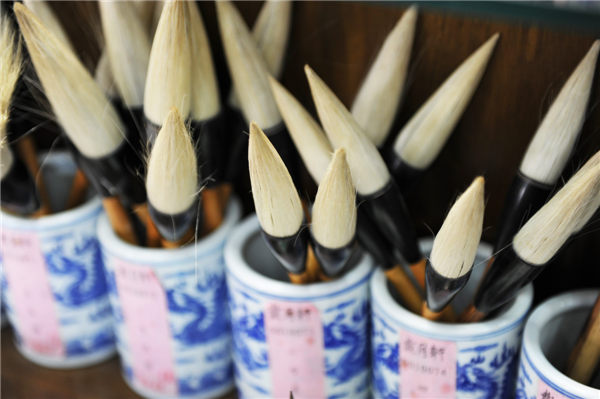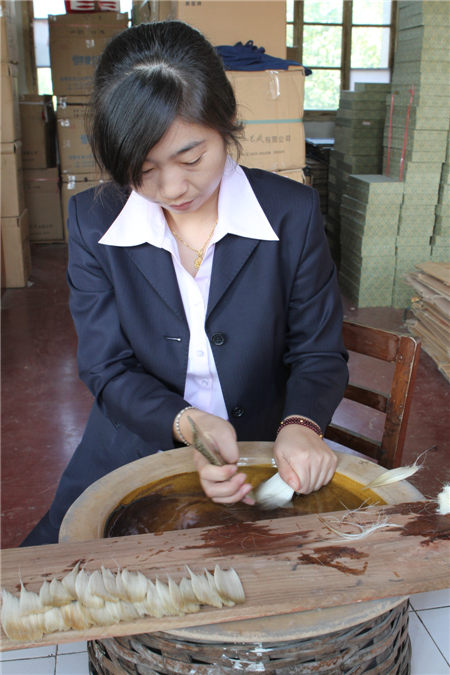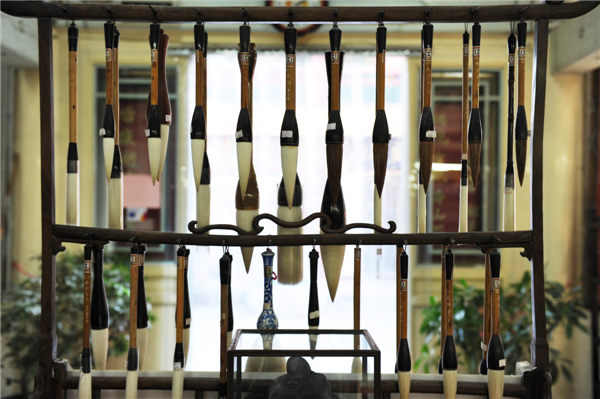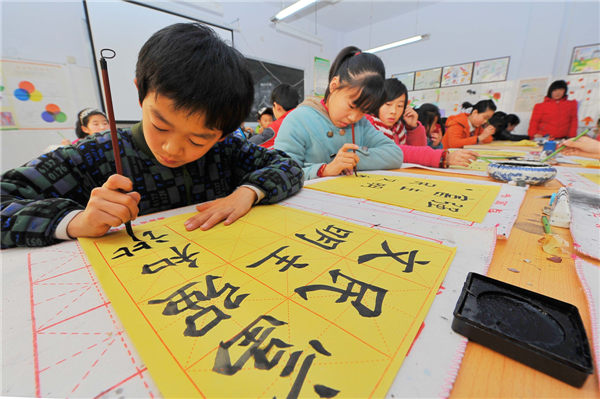
 |
|
A calligraphy expert shows students how to use a traditional brush pen in Hefei, Anhui province, on Jan 13. Du Yu/For China Daily |
Youngsters unwilling to learn ancient skills needed to produce the traditional pens used in calligraphy.
In the workshop of the Wangyipin Brush Pen Store in Huzhou, 29-year-old Shi Wangli brushes goat fur in water with an ox horn comb to select appropriate strands to make a traditional Chinese brush pen.
Her hands are immersed in water for at least eight hours a day, in both summer and winter. The selection of the hairs is one of the most important steps of making a quality brush pen and the work she does cannot be performed by a machine.
Shi is the youngest brush pen technician in the entire city of Huzhou. These days, few young people are willing to undertake such a difficult job.
Xu Jianfeng, general manager of the store, said he is worried the thousand-year-old techniques for making the Huzhou brush pens used in calligraphy will be lost with no young people willing to learn them.
"If the Huzhou brush pen dies, an important part of Chinese culture will die with it," he said.
Located in the north of Zhejiang province, Huzhou has been home to brush pen-making for thousands of years. In ancient China, an excellent Huzhou brush pen was representative of social status and was the aspiration of all men of letters.
In Chinese history, brush pens served as an essential tool for cultural inheritance.
 |
|
A selection of Huzhou brush pens. Photo provided to China Daily |
However, as modernization took place in China, brush pens were replaced firstly by nib pens, then ballpoint pens and now keyboards.
Zhu Yanlin, deputy director of the Huzhou Economic and Information Commission, said the key reason the art of making Huzhou brush pens is in danger of dying is not because fewer people use the brush pens these days.
"It is a very hard learning experience to make brush pens because the techniques are complicated and the working conditions are poor. The profits on brush pens are low so the income of such workers is lower than average," he said.
Shi would not reveal how much she earns a month making brush pens, only saying she earns much less than her peers.
"There are few people of my age choosing this job. If I had a daughter, I would not let her learn this because it is so hard," she said.
Zhu said that in 2008, Huzhou had less than 10 brush pen technicians aged below 40.
 |
|
Shi Wangli shows how they are made at the Wangyiping Brush Pen Store. Photo provided to China Daily |
"I believe that number would be much lower now. Most of the technicians have already passed the age of retirement, but are staying in their positions because, without them, the factories would have no one to make brush pens," he said.
There are 128 separate procedures involved in making a quality Huzhou brush pen, and all must be done by hand.
"Brush pens are made by the technicians' experience and the touch of fur on their hands," he said.
Xu said that 271-year-old Wang-yipin, with about 60 technicians, is the largest brush pen manufacturer in Huzhou.
"There are a lot more that have only two or three technicians, most of whom have reached their 60s or even 70s. The problem is more severe for them," he said.
According to official statistics, 102 companies and 187 family workshops make brush pens in Huzhou, employing more than 1,500 people. Together, they produce 10.3 million brush pens a year.
In January 2013, the Ministry of Education required elementary and middle schools to start calligraphy classes in order to save the Chinese tradition. That brought many orders for pens, but Xu said the increase in orders is bittersweet.
"We do not have enough people to make the pens," he said.
 |
|
Photo by Mai Tian/For China Daily |
Wangyipin is capable of producing 300,000 brush pens a year, with a value of 10 million yuan ($1.6 million).
"Actually, we don't lack orders at all. Our productivity is much lower than the total demand in the market. What we lack are skilled technicians to make the brush pens," he said.
The Huzhou government has issued preferential policies and set aside funds to revitalize the industry, but young people are still not attracted to the work.
As early as 2009, Huzhou issued stimulus plans to encourage young people to learn the art of making brush pens.
For apprentices under the age of 30 in key positions, the government grants subsidies for three consecutive years of up to 36,000 yuan.
"Their value cannot be properly reflected because the added-value is low, and this problem cannot be solved by the companies," Xu said.
He believes brush pen-making should not be viewed as just a type of traditional manufacturing, but should be regarded as a craft that represents Chinese culture.
"People should get to know the meanings and thoughts behind the techniques. If all of society considered our workers respectable technicians rather than just somebody working on an assembly line, maybe the conditions would become better," he said.
 |
|
Photo provided to China Daily |

Presented by Chinadaily.com.cn Registration Number: 10023870-7
Copyright © Ministry of Culture, P.R.China. All rights reserved